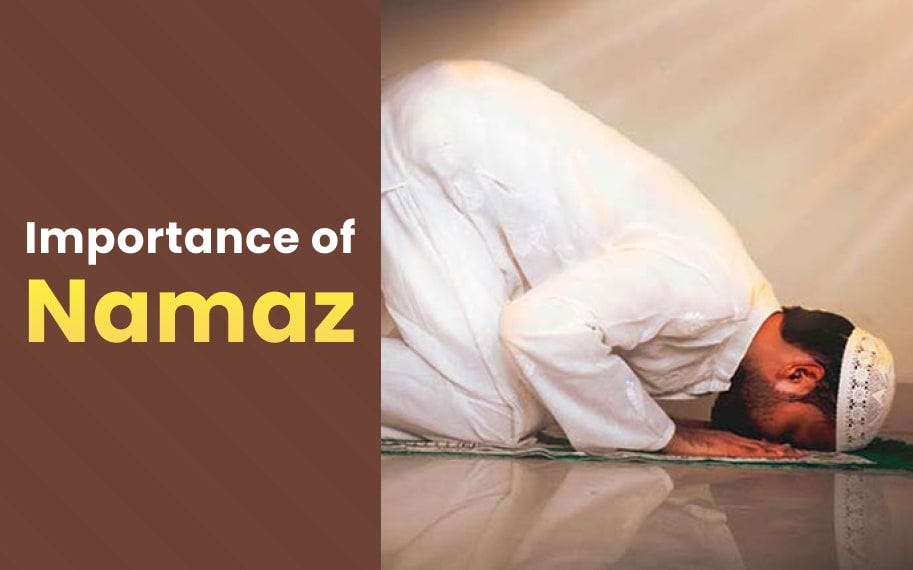Namaz, or Salah, is the Islamic practice of ritual prayer performed five times a day. It is one of the Five Pillars of Islam, which are the core practices that define a Muslim’s faith and actions. The importance and benefits of Namaz extend to spiritual, psychological, social, and physical dimensions of a believer’s life. Here’s a detailed look at these aspects:
Spiritual Benefits
- Strengthening Faith: Namaz is a direct form of communication with Allah (God). It reinforces a Muslim’s faith and serves as a constant reminder of the Creator.
- Spiritual Connection: Regular prayer deepens one’s relationship with Allah and fosters a sense of spirituality and connection to the divine.
- Forgiveness of Sins: Performing Namaz sincerely can lead to the forgiveness of minor sins. It is a way for Muslims to seek repentance and cleanse their souls.
- Sense of Peace and Contentment: Engaging in Namaz provides a sense of inner peace and tranquility, which comes from being in the presence of Allah and reflecting on His greatness.
Psychological Benefits
- Mental Discipline: The structured nature of Namaz fosters discipline and routine, which can be beneficial for mental clarity and focus.
- Stress Relief: The act of praying and the recitations during Namaz can act as a form of meditation, helping to reduce stress and anxiety.
- Emotional Stability: Regular prayer helps individuals manage their emotions and maintain a balanced state of mind, offering a form of spiritual comfort.
- Mindfulness and Reflection: Namaz encourages mindfulness and reflection, providing a break from daily routines to focus on higher values and personal growth.
Social Benefits
- Community Bonding: Performing Namaz in congregation (especially for Friday prayers and during Ramadan) strengthens community ties and fosters a sense of unity and solidarity among Muslims.
- Shared Spiritual Goals: Engaging in collective worship aligns individuals with the larger goals of the Muslim community, promoting a sense of belonging and shared purpose.
- Promotion of Morality: Namaz encourages ethical behavior and adherence to moral principles, which can positively influence interpersonal relationships and community harmony.
- Support System: Being part of a prayer community provides emotional and social support, creating a network of people who share common values and goals.
Physical Benefits
- Regular Physical Activity: The physical movements of Namaz—standing, bowing, prostrating, and sitting—offer mild exercise that can contribute to overall physical well-being.
- Improved Posture: The varied postures during Namaz can improve flexibility and posture. The act of standing and bowing helps stretch and strengthen muscles.
- Routine and Structure: The regularity of Namaz helps to establish a daily routine that encourages a balanced lifestyle and healthy habits.
Personal Growth and Development
- Time Management: Namaz encourages time management skills as Muslims schedule their day around prayer times, fostering a disciplined and organized lifestyle.
- Self-Reflection: Each prayer offers a moment for self-reflection and self-assessment, guiding individuals to consider their actions and intentions.
- Development of Patience: The act of waiting for the designated prayer times and performing Namaz consistently develops patience and perseverance.
- Gratitude and Humility: Namaz instills a sense of gratitude for Allah’s blessings and fosters humility by acknowledging one’s dependence on the Creator.
Educational Aspects
- Learning of Quranic Teachings: During Namaz, Muslims recite verses from the Quran, which helps in learning and memorizing Quranic teachings.
- Understanding of Rituals: The performance of Namaz familiarizes Muslims with the rituals of worship and the principles of Islamic law.
- Religious Knowledge: Regular practice of Namaz reinforces the learning of Islamic doctrines, rules, and the significance of religious obligations.
Conclusion
Namaz is much more than a set of ritualistic actions; it is a comprehensive practice that nurtures the spiritual, psychological, social, and physical aspects of a Muslim’s life. By fulfilling this fundamental obligation, Muslims can achieve a sense of peace, community, and personal growth, while also contributing to a disciplined and balanced lifestyle.
The benefits of Namaz reflect its profound significance in Islam and underscore why it is cherished as a central element of the Muslim faith and practice.


Leave A Comment